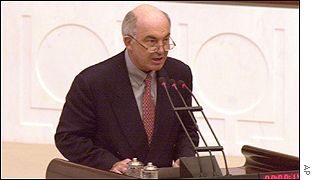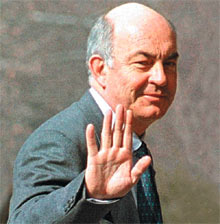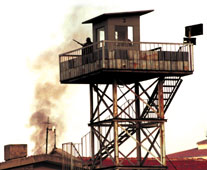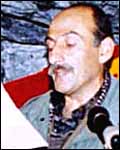28
th March 2001
![]()
2. "The Race to Revive Turkey's
Economy", Kemal Dervis, Turkey's state minister for economic
coordination, the World Bank veteran plucked out of Washington just
two weeks ago to repair his country's finances, was back here this week
to meet Treasury Secretary PaulH. O'Neill, International Monetary Fund
managing director Horst Kohler and World Bank President James D. Wolfensohn.
3. "Death fasters still not accepting medical care",
Fasting inmates say that if the Justice Ministry interferes with inmates
on death fasts in hospitals without their permission, inmates on death
fasts in prisons will stop taking water with sugar and salt. The Inmates
have already stopped taking vitamin B1, which was the most important
element keeping them alive.
4. "PKK unimpressed by Turkish EU reform plan",
Duran Kalkan, the so-called commander of the terrorist organization
PKK, tells illegal Kurdish satellite television that the plan falls
far short of the PKK's demands for open recognition of Kurdish cultural
rights.
5. "Foreign Minister Cem in U.S.: 'our National
Programm has been welcomed", Baki Ilkin, the Turkish Ambassador
to the U.S., hosted a reception in honor of Cem and State Minister Kemal
Dervis who are currently in Washington D.C. to attend the annual meeting
of the Turkish-American Council and to hold contacts with U.S. oficials.
6. "Damascus hopes of Turkish participation at
negotiations about the Tigris", the Syrian minister of
irrigation Taha al- Atrash has expressed his hope that Turkey will shortly
join the negotiations Syria will hold with Iraq to share the waters
of the Tigris after an agreement was reached concerned the waters of
the Euphrates.
1. - BBC - "Turkey's plea for $12bn":
Dervis: I hope we will obtain adequate foreign aid
Last week, Turkey and the International Monetary Fund (IMF) agreed a
new economic programme aimed at reviving foreign investors' confidence
after last month's financial crisis.
The IMF is deciding whether to bring forward $6.25bn of scheduled loans
to Turkey, but has not said whether it will increase the amount it has
allocated.
But Turkey says that it needs more immediate cash in order to survive
its financial difficulties, and is trying to secure $10-12bn of extra
aid by mid-April.
The nation has faced a cash crunch since abandoning a pegged exchange
rate last month to float he lira.
Since then, the lira has declined around 30% against the dollar.
Short-term help
Investors indicated last week that their confidence in Turkey would
only be restored once there was an offer of financial help from the
West.
Mr Dervis also confirmed that he had positive discussion with US Treasury
Secretary Paul O'Neill and that he was optimistic about securing the
cash needed.
"I think it is truly in the interest of Turkey's partners and the
international community to provide modest financing for the package."
Mr Dervis has vowed to press on with economic restructuring including
reforms to the banking sector and faster privatisations, and is confident
of seeing a turnaround by the summer.
Critical times
The financial crisis last month resulted from Turkey's inability to
meet the demands of a three-year IMF deflation programme.
It was triggered when Prime Minister Bulent Ecevit and President Ahmet
Necdet Sezer clashed publicly over the pace of an anti-corruption drive.
The government was forced to float the lira, which has fallen by about
30% against the US dollar, and inflation shot up again.
The IMF programme had previously cut inflation to 30% annually, compared
with triple digit levels of the 1990s. ![]()
2. - Washington Post - "The Race to Revive Turkey's
Economy":
Kemal Dervis, Turkey's state minister for economic coordination, the
World Bank veteran plucked out of Washington just two weeks ago to repair
his country's finances, was back here this week to meet Treasury Secretary
PaulH. O'Neill, International Monetary Fund managing director Horst
Kohler and World Bank President James D. Wolfensohn.
Dubbed the second most popular person in Turkey after President Ahmet
Necdet Sezer in opinion polls and even extolled as "the messiah"
by certain quarters of the Turkish press, Dervis is in a race against
time -- to accomplish in weeks what other economists could not do in
years.
His push to get a macroeconomic package of restructuring and reforms
established has to come to closure in two weeks for Turkey to qualify
for another $10 billion to $12 billion in financing from the IMF on
top of $6.25 billion already approved for this year and next year.
At a news conference at the Turkish Embassy yesterday, Dervis laid out
the management of Turkey's economic crisis in three stages. The first
key, he said, is structural change requiring legislation in parliament.
The second is to work intensively with the IMF and the World Bank toward
a new letter of intent that the IMF would be ready to support. Third,
the program has to be discussed domestically in Turkey, debated and
explained to unions, associations and all sectors of society.
"We have to listen to what society has to say," he noted,
reflecting sensitivity to criticism of previous cookie-cutter solutions
imposed by multilateral institutions.
He said he expects the first phase to wind up in mid-April, while the
second phase will require two to three months to reestablish macroeconomic
equilibrium. He projected high inflation and economic shrinkage in the
next couple of months, but said the situation should show signs of improvement
in the third quarter, leading to a "turnaround next summer."
Dervis said the silver lining of the crisis was that, with exchange
rates becoming competitive after Turkey scrapped currency controls to
avert last month's crash, Turkey can reenter markets and growth will
be fueled by an expected boost from tourism beginning in June.
Turkey's three state banks, a source of short-term populism but longer-term
weakness in the economy, are to come under the management of a new board
that will be in place within 10 days, he announced, calling the merger
"a crucial and radical measure."
Introducing Dervis at a luncheon yesterday at the Westin Hotel, Tuncay
Ozilhan, chairman of the Turkish Industrialists' and Businessmen's Association,
praised Dervis for his drive and unbounded optimism, but pointed out
that the expectations for him were "enormous and difficult for
one person" to achieve alone.
"We just have to tell it like it is. We cannot exaggerate or underestimate
things," Dervis said. ![]()
3. - Turkish Daily News - "Death fasters still
not accepting medical care":
Fasting inmates say that if the Justice Ministry interferes with
inmates on death fasts in hospitals without their permission, inmates
on death fasts in prisons will stop taking water with sugar and salt.
The Inmates have already stopped taking vitamin B1, which was the most
important element keeping them alive
IZMIR
More than 250 inmates who launched death fasts protesting the implementation
of the cell-based F-type prison have surpassed 158 days of actual fasting.
The inmates' health conditions have reached critical point, with eight
of the 69 inmates in Edirne being hospitalized. However, these eight
inmates have refused medical care.
Doctors said if this continues, more deaths will follow. Cengiz Soydas,
who was an inmate at Sincan F-type Prison, died on March 21, which was
the 152nd day of his fast. Izmir Chamber of Doctors Chairman Fatih Surenkok,
in an interview with the Turkish Daily News, said: "Following announcements
from the Justice Ministry that they can medically interfere with inmates
on death fasts, the inmates have announced that if the Justice Ministry
interferes the inmates on death fast in hospitals, they will stop taking
water with sugar and salt. This is a very serious situation. If those
inmates on death fasts who have quit taking vitamin B1, which was extremely
important in keeping them alive, quit taking water with sugar or salt,
more deaths will follow the death of Cengiz Soydas.
"Eight inmates on death fasts in Edirne were hospitalized because
of their worsening health conditions. These inmates now weigh under
45 kilograms. Sevgi Erdogan, who is on the death fast in Usak, is also
in a critical condition. These inmates refuse medical care," Surenkok
said, adding that if the Justice Ministry does not take a step towards
stopping the death fast, the situation will worsen.
Izmir's Public Prosecutor has demanded that Izmir Chamber of Doctors
watches the 25 inmates on death fasts in Izmir, Surenkok said. He stated
they continuously watched the health conditions of the inmates, however
they refuse medical treatment and if they refuse treatment doctors are
unable to do anything anyway. "This cannot go on in this way. Something
must be done to stop this. The inmates on death fasts are now ingesting
water with sugar and salt whilst they are unconscious. We don't know
how long they can stand this."
According to the Association for the Solidarity of Inmates' Families
(TAYAD), 29 inmates on death fasts are in the hospitals in Ankara, 30
inmates are in Istanbul Bayrampasa hospital, 14 inmates on death fasts
are in Izmir Ataturk Hospital and eight inmates are in Edirne hospital.
The rest of the inmates on death fasts are in Sincan F-type Prison,
Edirne F-type Prison, Kandira F-type Prison, Tekerdag F-type Prison,
Ulucanlar F-type Prison, and Kartal, Buca, Kutahya, Malatya, Manisa,
Usak, Nigde, Antakya and Eskisehir prisons.
TAYAD said more than 800 inmates are on hunger strikes supporting death
fasting inmates, who are demanding the cancellation of the implementation
of cell-based F-type prisons, annulment of State Security Courts (DGMs)
and the formation of a commission including doctors, lawyers, prisoners'
relatives and representatives of nongovernmental organizations (NGOs)
to inspect the prisons.
Inmates on death fasts and hunger strikes are members of various leftist
groups, like the Revolutionary People's Liberation Party-Front (DHKP-C),
the Turkish Communist Party -Marxist and Leninists- (TKP-ML) and the
Turkish Communist Workers Party (TKIP). ![]()
4. - Turkish Daily News - "PKK unimpressed by
Turkish EU reform plan":
Duran Kalkan, the so-called commander of the terrorist organization
PKK, tells illegal Kurdish satellite television that the plan falls
far short of the PKK's demands for open recognition of Kurdish cultural
rights
ANKARA
Terrorists have dismissed Turkey's plan of reforms to ensure European
Union membership as a halfhearted document that fails to address what
they say are the grievances of some 12 million Kurds, Reuters reported.
On Monday Turkey presented its National Program of reforms to the EU,
outlining a lengthy process of change to usher predominantly Muslim
Turkey into the wealthy western bloc.
Duran Kalkan, a so-called commander of the Kurdistan Workers Party (PKK)
terrorist group, told illegal Kurdish satellite television late on Monday
that the plan falls far short of the PKK's demands for open recognition
of Kurdish cultural rights.
"It's called a National Program but it does not reflect the structure
or composition of Turkish society. The Kurdish people are not even named
in this program... This is not a program that can really be implemented
or one that will change much if it is implemented. It's not a program
of solutions," Kalkan claimed.
The PKK says it has abandoned the terrorist activities against Turkish
security forces for Kurdish autonomy in which more than 30,000 people
have died since 1984. It says it now seeks to use political pressure
to win cultural rights for Turkey's Kurds through the peaceful democratic
process.
"If the people who made this program think they can create a new
Turkey with it, then fine, our party will not be obstructive. But we
can comfortably say that such a program will not democratize Turkey
or solve the Kurdish problem," Kalkan claimed.
Ankara rejects the PKK's cease fire as a ploy to help captured terrorist
leader Abdullah Ocalan avoid a death sentence. It refuses any talks
with the separatists, dubbing them "terrorists" and pledging
to wipe out any who fail to surrender to authorities.
Turkish law bans education and broadcasting in Kurdish as potentially
fuelling violent separatist nationalism.
The Program acknowledges the right of citizens to speak languages other
than Turkish, but does not specifically mention Kurdish. It ignores
European calls for an end to the bans on education and broadcasting.
![]()
5. - Anadolu Agency - "Foreign Minister Cem in
U.S.: 'our National Programm has been welcomed":
WASHINGTON D.C.
Foreign Minister Ismail Cem said early on Tuesday, ''the National Program
submitted to the European Union (EU), has been welcomed.''
Baki Ilkin, the Turkish Ambassador to the U.S., hosted a reception in
honor of Cem and State Minister Kemal Dervis who are currently in Washington
D.C. to attend the annual meeting of the Turkish-American Council and
to hold contacts with U.S. oficials.
Respornding to a question about the National Program, Foreign Minister
Cem said, ''the EU Council and Commission released statements. Guenter
Verheugen, the EU commissioner for enlargement, also made a statement.
We can consider these statements positive in general. We cannot expect
everyone to satisfy equally with each page and each line of these national
programs. But Turkey's National Program has been welcomed. Verheugen
also expressed his satisfaction.''
Cem told reporters, ''the U.S. is interested in issues regarded with
our cultural geography. We cannot think in the same way on every issue.
But we exchange our opinions. What I will do in Washington D.C. is to
exchange opinions with U.S. officials.''
Cem stressed that the latest developments in Macedonia would be taken
up within framework of the developments in the Balkans.
When asked whether or not he would bring onto agenda Turkey's losses
stemming from embargo imposed on Iraq, Cem told reporters, ''I have
already brought this issue on the agenda.''
Responding to another question, Cem said, ''both Foreign Ministry and
I assist State Minister Dervis in every occasion.'' ![]()
6. - Arabic News - "Damascus hopes of Turkish
participation at negotiations about the Tigris":
The Syrian minister of irrigation Taha al- Atrash has expressed his
hope that Turkey will shortly join the negotiations Syria will hold
with Iraq to share the waters of the Tigris after an agreement was reached
concerned the waters of the Euphrates.
In a statement to the Qatari daily al-Watan issued on Sunday, the Syrian
minister added that " as for the waters of the Euphrates, this
issue is agreed upon." He explained that discussions are now underway
to reach a joint agreement." Among the three states to share the
waters of the two rivers." He expressed his hope that Turkey will
meet a call addressed by the Iraqi and Syrian sides during their recent
talks.
He continued:" we hope the Turkish minister will respond to this
call to sit with us and return back to the talks so as to maintain agreement
and coordination between three neighboring countries which lived since
history on the consumption of waters of the two rivers."![]()